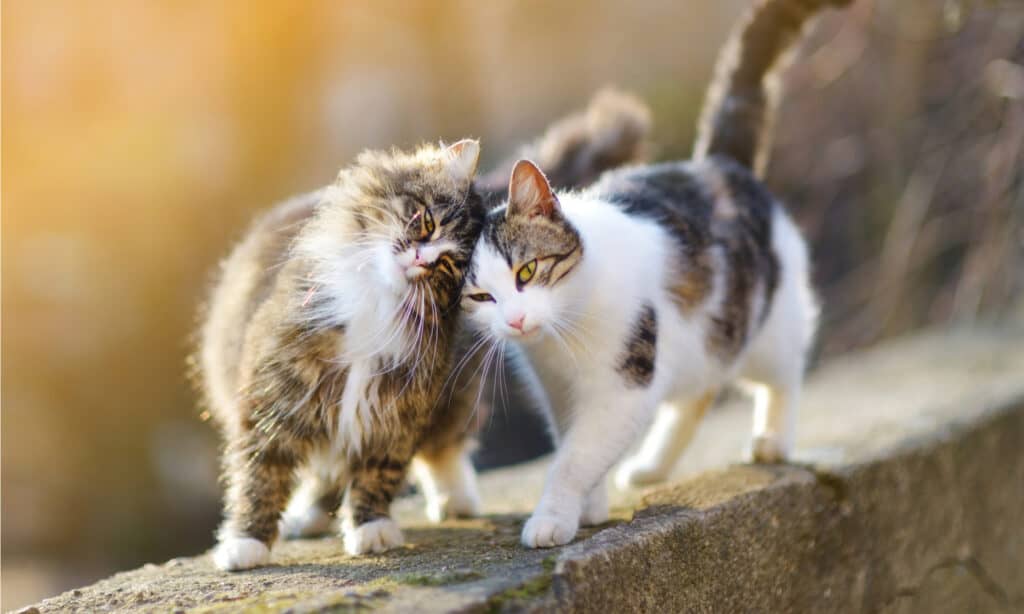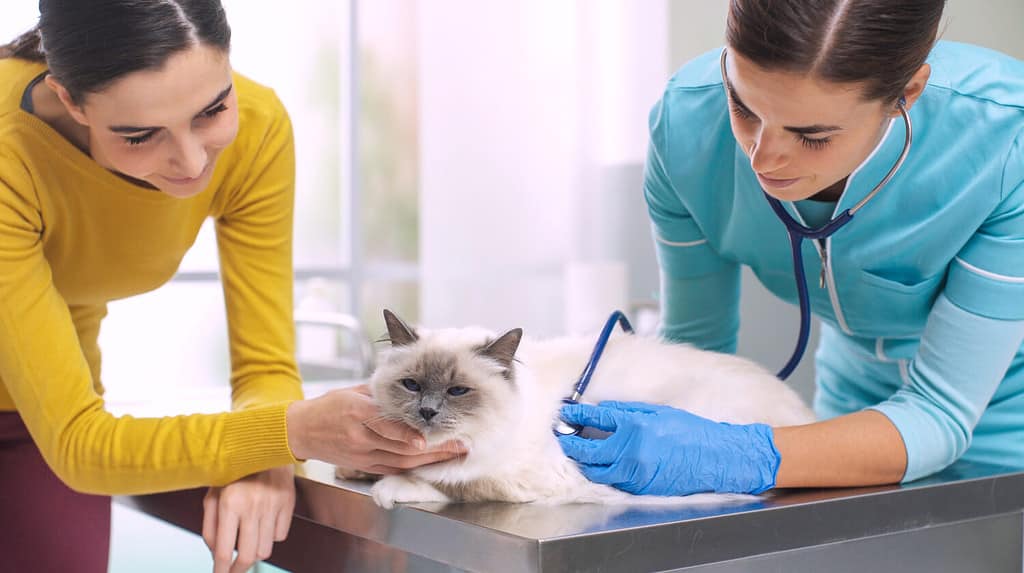The smell of cat urine is unmistakable. Even with scented litter or frequent litter box changes, the scent trickles up into your nostrils, activating your sense of smell with an ammonia-like scent. You love your fur balls, so it’s something you learn to deal with (much like scratched furniture and cat hair on all your favorite black clothes). But what about cat spraying? That’s a different ball game altogether. Discover cat spraying vs. peeing — what it is and why cats do it!
Cat Spraying vs. Peeing: What’s the Difference?
Cat spraying is intentional and aggressive, meant to mark territories, and peeing is simply when cats relieve themselves. The main known cause of cat spraying is territory marking. Cats have scent glands in their anal area and the goal is to spread the pheromones that carry information to other cats.
While you’re picking up on the stench, other cats can pick up on the messages your cat is sending via spraying. They may be signaling that they’re scared in these pheromone-coded messages, or they could be making it known that this is their home, and no one should come near it. Or they could be letting cats of the opposite sex know that they’re single and ready to mingle.

Cats mark one another with their scents.
©MNStudio/Shutterstock.com
Cat peeing or urination is done in a squatting position, often in a litter box or any other designated area. It is normal behavior for a cat’s hygiene and elimination of waste products. If a cat is not peeing in the usual places, it is often because something is not right. This could be a sign of an infection, pain, stress, or anxiety. Peeing in unusual spots warrants a call to your vet for a full check-up.
Why Do Cats Spray?
Cat spraying is the same as urine marking and cats normally do it on vertical surfaces such as furniture and doorways (even on walls!). It is more common with un-neutered male cats, but females and neutered male cats can also spray. Cats also make their marks with feces, which just makes for an even more fun clean-up experience. After having sprayed, cats don’t scratch or try to cover it up at all. They don’t sniff either as they intentionally did it to announce their territory.
By spraying, cats are establishing two things. First, they’re letting their presence be known, and letting other cats know of their reproductive availability status. Second, they are setting firm boundaries for other competing cats. Stress can only trigger spraying, however. Cat fights and changes in the environment can stress out a cat, causing them to start spraying.
What To Do If Your Cat Is Spraying
If your cat is spraying, there could be a variety of reasons that require attention. It could be because there is an emotional trauma that he or she is dealing with, such as the feeling of stress due to a new pet in the family. Their regular caregivers may be away, or you may be in a stressful situation, and the cats are picking up on the energy in the home.
You might wonder, “Why is that affecting the cats?” Well, they are living, conscious beings, and although they don’t have the ability to speak their concerns, their feelings are very much present. However, if it’s not a stress-related reason, it could be that your cat is feeling territorial. This happens when you’ve moved to a new home and there was a pet that lived there previously. Cats are fierce about their territories and work themselves up to ensure that their home base is marked with their scent.

Check with your vet if your cat has recently started spraying.
©Stock-Asso/Shutterstock.com
It’s why they rub themselves on you when you get home after a long day away from home. They’re claiming you back into their territory, marking you with their scent. Spaying or neutering your cats is a way to stop the spraying when it’s related to territory marking. But talk to your veterinarian as there may be other factors involved, and you may need to follow through with due diligence, making a very conscientious sweep in your household.
Cats are adorable and make great companions. They give you that unconditional love that you deserve but in the same token, they look for a peaceful and harmonious home. If you realize that the stress of your home environment is stressing your cat out, causing him or her to spray, it’s time to make some changes. Cats are great mirrors, reminding you to pause and reconsider, showing you how lovable you are, and reminding you just how important boundaries are.
The photo featured at the top of this post is © Elaina Speaks/Shutterstock.com
Thank you for reading! Have some feedback for us? Contact the AZ Animals editorial team.







